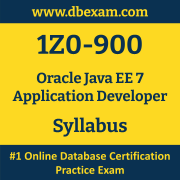 You can use this Oracle 1Z0-900 exam study guide to collect all the information about the Oracle Java EE 7 Application Developer exam. The Oracle 1Z0-900 certification exam is mainly targeted to those candidates who have some experience or exposure to Oracle Java technology and want to flourish their career with Oracle Certified Professional, Java EE 7 Application Developer credential.
You can use this Oracle 1Z0-900 exam study guide to collect all the information about the Oracle Java EE 7 Application Developer exam. The Oracle 1Z0-900 certification exam is mainly targeted to those candidates who have some experience or exposure to Oracle Java technology and want to flourish their career with Oracle Certified Professional, Java EE 7 Application Developer credential.
The Oracle 1Z0-900 certification exam validates your understanding of the Oracle Java technology and sets the stage for your future progression. Your preparation plan for Oracle Java EE 7 Application Developer Certification exam should include hands-on practice or on-the-job experience performing the tasks described in following certification exam syllabus topics.
Oracle 1Z0-900 Exam Details:
| Exam Name | Oracle Java EE 7 Application Developer |
| Exam Code | 1Z0-900 |
| Exam Price | USD $245 (Pricing may vary by country or by localized currency) |
| Duration | 120 minutes |
| Number of Questions | 70 |
| Passing Score | 66% |
| Format | Multiple Choice Questions (MCQ) |
| Recommended Training | Enterprise Java Developer |
| Schedule Exam | Buy Oracle Training and Certification |
| Sample Questions | Oracle Certified Professional, Java EE 7 Application Developer |
| Recommended Practice | 1Z0-900 Online Practice Exam |
Oracle 1Z0-900 Syllabus Topics:
| Understand Java EE Architecture |
- Describe Java EE 7 standards, containers, APIs, and services - Differentiate between application component functionalities as they apply to different tiers and containers, including Java EE Web Container, Business Logic implementation and WebServices - Create, package and deploy Java EE application - Demonstrate understanding of Enterprise JavaBeans and CDI beans, their lifecycle and memory scopes - Demonstrate understanding of the relationship between bean components, annotations, injections, and JNDI |
| Manage Persistence using JPA Entities and BeanValidation |
- Create JPA Entity and Relationship Object-Relational Mappings (ORM) - Use Entity Manager to perform database operations, transactions and locking with JPA entities - Handle entity data with conversions, validations, and key generation - Create and execute JPQL statements |
| Implement Business Logic by Using EJBs |
- Create session EJB components containing synchronous and asynchronous business methods, manage the life cycle container callbacks and use interceptors - Demonstrate understanding of how to control EJB transactions, distinguish Container Managed (CMT) and Bean Managed (BMT) transactions - Create EJB timers |
| Use Java Message Service API |
- Describe the Java Message Service (JMS) messaging models and implement Java SE and Java EE message producers and consumers, including Message-Driven beans - Use transactions with JMS API |
| Implement SOAP Services by Using JAX-WS and JAXB APIs |
- Create SOAP Web Services and Clients using JAX-WS API - Define Java to XML Schema mappings to marshall and unmarshall Java Objects by using JAXB API |
| Create Java Web Applications using Servlets |
- Create Java Servlets, describe how they are mapped to urls and use HTTP methods - Handle HTTP headers, parameters, cookies - Manage servlet life cycle with container callback methods and WebFilters |
| Create Java Web Applications using JSPs |
- Describe JSP life cycle - Describe JSP syntax, use tag libraries and Expression Language (EL) - Handle errors using Servlets and Java Server Pages |
| Implement REST Services using JAX-RS API |
- Understand and Apply REST service conventions - Create REST Services and clients using JAX-RS API |
| Create Java Applications using WebSockets |
- Understand and utilise WebSockets communication style and lifecycle - Create WebSocket Server and Client Endpoint Handlers using JSR 356 API and JavaScript - Produce and consume, encode and decode WebSocket messages |
| Develop Web Applications using JSFs |
- Describe JSF arcitecture, lifecycle and navigation - Understand JSF syntax and use JSF Tag Libraries - Handle localisation and produce messages - Use Expression Language (EL) and interact with CDI beans |
| Secure Java EE 7 Applications |
- Describe Java EE declarative and programmatic security and configure authentication using application roles and security constraints and Login Modules - Describe WebServices security standards |
| Use CDI Beans | - Create CDI Bean Qualifiers, Producers, Disposers, Interceptors, Events and Stereotypes |
| Use Concurrency API in Java EE 7 Applications | - Demonstrate understanding of Java Concurrency Utilities and use Managed Executors |
| Use Batch API in Java EE 7 Applications | - Describe batch jobs using JSL XML documents and JSR 352 API |
The Oracle Java EE Application Developer Certification Program certifies candidates on skills and knowledge related to Oracle Java products and technologies. The Oracle 1Z0-900 is granted based on a combination of passing exams, training, and performance-based assignments, depending on the level of certification. Oracle Java EE 7 Application Developer certification is a real benchmark of experience and expertise that helps you stand out in a crowd among employers. To ensure success, Oracle recommends combining education courses, practice exams, and hands-on experience to prepare for your Oracle Certified Professional, Java EE 7 Application Developer certification exam as questions will test your ability to apply the knowledge you have gained in hands-on practice or professional experience.
